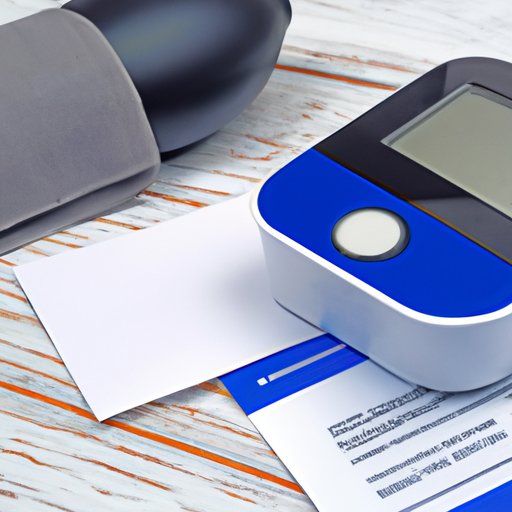
I. Introduction
High blood pressure, also known as hypertension, is a common medical condition that affects millions of people worldwide. It occurs when the force of your blood pushing against the walls of your arteries is consistently too high, which can damage your arteries and increase the risk of serious health problems such as heart disease and stroke. But the good news is that there are many simple and effective ways to reduce high blood pressure, from maintaining a healthy diet to reducing stress. In this article, we’ll outline some tips and tricks for getting your blood pressure down and keeping it under control.
II. Maintain a healthy diet
What you eat can have a big impact on your blood pressure. A diet rich in fruits, vegetables, and lean protein like chicken, fish, or beans can help reduce your blood pressure naturally. On the other hand, foods that are high in saturated and trans fats, processed food, and salt can raise your blood pressure. It’s therefore important to choose your foods wisely and limit your salt intake to less than 2,300 milligrams per day (ideally, less than 1,500 milligrams).
III. Exercise regularly
Regular physical activity is a great way to control your blood pressure. When you exercise, your heart beats faster, which helps to pump more blood and oxygen to your muscles. This, in turn, can help to lower your blood pressure. Aerobic exercises such as brisk walking, jogging, cycling, or swimming are particularly effective for managing blood pressure. It’s recommended that you exercise for at least 30 minutes a day, five days a week to achieve the best results.
IV. Lose weight
If you’re overweight or obese, losing weight can significantly lower your blood pressure. This is because the more body weight you carry, the more blood flow you need to supply oxygen and nutrients to your tissues, which can increase your blood pressure. By losing excess weight, particularly around your waistline, you can reduce your blood pressure and lower your risk for other health problems. The most effective way to lose weight is through a combination of a healthy diet and regular exercise.
V. Quit smoking
Smoking is a major risk factor for high blood pressure, as well as many other serious health problems. Nicotine in cigarettes narrows your blood vessels, which can cause your blood pressure to rise. Quitting smoking is therefore one of the best things you can do to improve your overall health. There are many resources available to help you quit smoking, including nicotine replacement therapy, prescription medications, and support groups.
VI. Reduce stress
Stress can also have a negative impact on your blood pressure. When you’re under stress, your body produces hormones that can cause your heart to beat faster and your blood vessels to narrow. Over time, this can lead to high blood pressure. Therefore, it’s important to find ways to manage stress in your life, such as practicing relaxation techniques like meditation, yoga, or deep breathing exercises.
VII. Limit alcohol intake
Drinking too much alcohol can raise your blood pressure and increase your risk of other health problems. The recommended limit for alcohol intake is no more than one drink per day for women, and no more than two drinks per day for men. If you have high blood pressure or are trying to lower your blood pressure, it’s best to avoid alcohol altogether.
VIII. Monitor your blood pressure regularly
Regular blood pressure checks are an important part of managing high blood pressure. Monitoring your blood pressure at home can help you keep track of your progress and make any necessary adjustments to your diet or lifestyle. It’s recommended that you check your blood pressure at least once a week, at the same time of day, and record your readings in a journal or app. Be sure to share your readings with your doctor so they can help you track your progress and make any necessary adjustments to your treatment plan.
IX. Conclusion
High blood pressure is a serious health issue that requires careful management. By making simple lifestyle changes, such as maintaining a healthy diet, exercising regularly, losing weight, quitting smoking, reducing stress, limiting alcohol intake, and monitoring your blood pressure regularly, you can reduce your blood pressure and lower your risk for serious health problems. So take control of your health today and make the necessary changes to get your blood pressure down.




